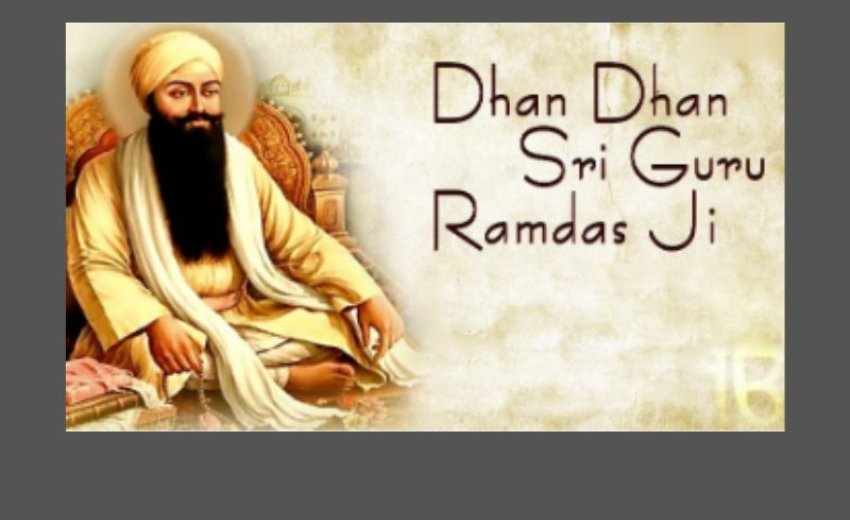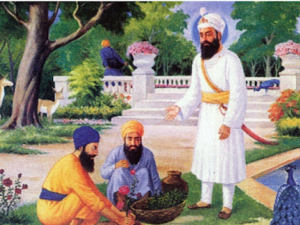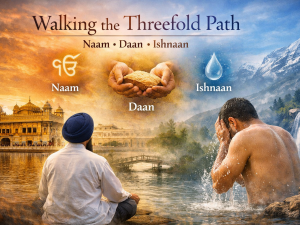The pre-dawn darkness of Chuna Mandi in Lahore was broken only by the flickering oil lamps of early vendors. Seven-year-old Jetha crouched beside his small wooden cart, his thin fingers sorting through brown chickpeas by the dim light. The familiar ache of loss sat heavy in his chest. Six months had passed since his parents died, leaving him in his grandmother's weathered care.
"Jetha, beta," Nani ji's voice called from their single-room dwelling, "remember what I taught you. Look each customer in the eye, speak with respect, and never shortchange anyone. Your parents' souls are watching."
The boy nodded solemnly, understanding that each small coin earned would mean the difference between eating and sleeping hungry. Around him, Lahore's grand bazaar stirred to life, the calls of muezzins echoing from distant minarets, the shuffle of early worshippers, and the gradual awakening of a city that had seen empires rise and fall.
As Jetha lifted his cart's wooden handles, his grandmother noticed something that always made her pause. Despite their poverty and his state as an orphan, the child's eyes held an unusual light, not the desperate brightness of survival, but something more profound and more serene. It was as if the Divine had already marked him, preparing him for a destiny none could yet imagine.
"Today might bring something special, beta," she whispered, touching his head in blessing. "Keep your heart open to whatever the Almighty sends."
******
Five years of selling chickpeas had transformed Jetha from a grieving child into a thoughtful young man of twelve. His reputation for honesty had grown throughout Chuna Mandi, and regular customers sought him out not just for his wares but also for his gentle manner and wise words, which seemed far beyond his years.
It was during the spring of 1546 that Mata Sulakhani, a devout woman who had become like an aunt to Jetha, brought news that would change everything.
"Child," she said, purchasing her usual portion of chickpeas, "I've just returned from Khadur. There's are great souls there, Guru Angad and Baba Amardas. The way Guru ji speaks of the Divine, the love in his eyes... I've never experienced anything like it. The entire atmosphere around him vibrates with spiritual energy."
That night, Jetha couldn't sleep. Something stirred within him, a longing he couldn't name. For days, he found himself distracted during his sales, his heart pulling toward something unknown. Finally, he approached his grandmother.
"Nani ji," he said, kneeling beside her evening prayers, "I feel called to visit Guru Ji in Khadur. Something inside me won't rest until I go."
His grandmother studied his face in the lamplight, seeing the same mysterious depth she'd noticed since his childhood. "If your heart calls you to a holy man, beta, then it's the Divine calling. Go, but promise me you'll return."
The three-day journey to Khadur was Jetha's first time leaving Lahore. With each mile, the pull grew stronger, as if invisible threads were drawing him toward his destiny. When he finally arrived at the Guru's court, evening prayers were beginning.
The moment Jetha entered the congregation, Baba Amardas paused mid-recitation. Across the gathering of hundreds, their eyes met, and something profound passed between them, a recognition that transcended the physical world.
After the prayers, the Baba Amar Das called softly, "The young one from Lahore, come forward."
Jetha's heart hammered as he approached. How could the Baba ji know where he was from?
"Sat Sri Akal, Baba ji," Jetha whispered, prostrating himself.
Baba Amardas placed a gentle hand on his head. "Rise, child. I have been waiting for you, though I knew not from where you would come. Your light has been travelling toward ours across time itself."
"I... I don't understand, Baba ji."
"You will," the Baba smiled. "For now, know that you are home."
******
When Guru Amar Das settled at Goindwal in 1552, Jetha also moved to the new township, and spent most of his time at the guru's court.
Over the next decade, Jetha's integration into the Guru's household was gradual but profound. He began by performing simple tasks, sweeping the courtyard, serving water to visitors, helping in the community kitchen. His devotion was absolute; he would rise before dawn and work until late evening, never complaining, never seeking recognition.
Guru Amardas Sahib's family initially welcomed him with kindness, but as years passed and the Guru's special affection for Jetha became apparent, tensions began to simmer.
"Father shows him more attention than his own sons," Bhai Mohan confided to his brother Bhai Mohri one evening in 1552. "The sangat notices. They whisper about favouritism."
Bhai Mohri nodded grimly. "And now, father speaks of arranging Jetha's marriage to our sister Bhani. How can a chickpea seller become our brother-in-law?"
The situation grew more complex when Guru Amardas Sahib began including Jetha in important decisions and sending him as his representative to various Sikh centers. Each assignment proved Jetha's wisdom and spiritual depth, but also increased the brothers' resentment.
The breaking point came in 1553 when Guru Amardas Sahib announced Jetha's engagement to Bibi Bhani. The community was divided; some recognized Jetha's spiritual qualities, while others questioned the Guru's judgment.
"Respected Guru ji," elder Bhai Budha spoke during a private family gathering, "the sangat is troubled. They ask why bloodline doesn't matter in your household when it matters everywhere else in the world."
Guru Amardas Sahib's response was measured but firm. "The Divine light flows through spiritual lineage, not blood. Watch Jetha's actions, listen to his words, and observe his devotion. Then tell me if you see the light."
However, doubts persisted, and even some devoted Sikhs began to question whether the Guru's affection had clouded his judgment.
******
The crisis that would test everything came in 1566 when orthodox Brahmins formally complained to Emperor Akbar about the langar system. The practice of people from all castes eating together violated traditional hierarchies, and influential religious leaders demanded its cessation.
"Someone must go to Lahore to address the Emperor," Guru Amardas Sahib announced to his assembled family and close disciples. "Our way of life hangs in the balance."
"I will go, Father." Bhai Mohan stepped forward immediately. "As your eldest son, this responsibility is mine."
"No," Bhai Mohri interjected, "I should go. I have more experience in worldly matters."
The room buzzed with suggestions until Jetha, now thirty-two and known as one of the Guru's most trusted disciples, spoke quietly from the back.
"If the Guru permits, I would be honoured to carry his message to the Emperor."
The silence that followed was deafening. Bhai Mohan's face flushed with anger and humiliation.
"You?" he said, his voice tight with years of suppressed resentment. "A seller of chickpeas would represent the house of Guru Nanak before the Mughal Emperor? Have we fallen so low?"
The confrontation that had been building for years finally erupted. "What authority do you have?" Bhai Mohan continued, his voice rising. "What right? You're not even family!"
"But he is family," Bibi Bhani spoke for the first time, her voice calm but firm. "And he understands our Guru's message better than anyone."
All eyes turned to Guru Amardas Sahib. The elderly Guru's face showed no anger, only infinite sadness at the pain he saw in his son's eyes.
"My beloved son," he said to Bhai Mohan, "your hurt is understandable, but earthly concerns cloud your vision.
The one who serves with the purest heart, who embodies our message most completely, must carry our voice to the Emperor. That person is Jetha."
The decision split the household. Some supported the Guru's choice, while others whispered that age had affected his judgment.
******
The journey to Emperor Akbar's court in Lahore was fraught with anxiety. Jetha traveled with two companions, carrying the weight of his community's future on his shoulders. The night before the audience, he sat in meditation, feeling the presence of his Guru across the miles.
Standing in the magnificent Diwan-i-Khas, surrounded by courtiers in silk and jewels, Jetha had never felt more aware of his simple clothes and humble background. The assembled Brahmins smirked openly, confident that this common man could never defend the revolutionary practice of langar.
"Your Majesty," the chief Brahmin spoke with practiced eloquence, "this practice of eating together violates the sacred varna system established by our scriptures. The pure and impure cannot mix without destroying the cosmic order. We seek your royal intervention to stop this dangerous practice."
Emperor Akbar, known for his interest in religious discussions, leaned forward with curiosity. "And what does the representative of Guru Amardas have to say to this?"
Jetha felt the moment's weight, not just for himself, but for every Sikh, every person who had found dignity in the Guru's langar. He closed his eyes briefly, feeling his Guru's presence, then spoke.
"Your Majesty," he began, his voice growing stronger with each word, "when a mother prepares food for her children, does she consider which child is worthy to eat first? Or does she feed each according to their hunger and her love?"
The Emperor's eyes sharpened with interest. "Continue."
"The Creator is the ultimate mother, the father of all creation. In the Divine's kitchen, there is no high or low, no pure or impure. We are all children of the same Source, deserving of the same nourishment, the same love, the same dignity."
He paused, letting the metaphor sink in. "The langar doesn't destroy order, Your Majesty. It reveals the true order, the order of divine love that sees beyond the illusions of birth and status. When hunger strikes, the stomach doesn't announce its caste. When tears fall in sorrow, they carry no mark of high or low birth."
A murmur ran through the court. The Brahmins began to protest, but Akbar raised his hand for silence.
"The young man speaks wisdom," the Emperor declared. "How can we claim to worship the same God while treating His children differently? The langar practice shall continue. Let no one interfere with this expression of divine equality."
******
The news of Jetha's success reached Goindwal before he did, carried by swift messengers. When he finally arrived, the entire community had gathered to welcome him. The triumphant reception, however, couldn't mask the more profound healing that was needed within the household.
That evening, in the privacy of the family quarters, Guru Amardas Sahib called his sons and Jetha together.
"My beloved children," he began, his voice carrying the weight of his years and wisdom, "today's victory belongs to all of us, but the divisions in our house wound my heart more than any external enemy could."
Bhai Mohan, who had spent the day in quiet reflection, finally spoke. "Father, I... I have been blind. My jealousy made me forget that your light shines through whoever serves most purely. Today, Jetha…" he paused, using the respectful term for the first time, "…Bhai Jetha proved that spiritual greatness has nothing to do with birth."
He turned to Jetha, his eyes wet with tears. "Brother, forgive my hardness of heart. I see now what our father saw from the beginning. Your devotion puts mine to shame."
Jetha immediately embraced him. "There's nothing to forgive, Bhai Mohan. We are all servants of the same light. Your father's love encompasses us all equally."
Over the following months, the family gradually healed. Bhai Mohan and Bhai Mohri began to see Jetha not as a rival but as a spiritual brother whose example elevated them all. The community, witnessing this transformation, also began to understand the more profound wisdom of their Guru's choices.
In 1574, sensing his time drawing near, Guru Amardas Sahib made his final, most significant decision. During a quiet evening gathering, he placed his hand on Jetha's head.
"From this day forward," he announced, "Jetha shall be known as Ramdas, the servant of the Divine. And when my time comes to merge with the Eternal, he shall carry the light of Guru Nanak forward as our fourth Guru."
The ceremony of succession was profound in its simplicity. As the coconut and five coins were placed before the new Guru, as the sangat bowed in reverence, something shifted in the spiritual atmosphere. The light that had begun in a humble orphan selling chickpeas now blazed as the divine flame of guidance for all who sought truth.
******
Five years later, Guru Ramdas Sahib stood on the elevated platform overlooking the construction site that would become Amritsar. Workers laboured steadily, digging what would become the sacred sarovar, while merchants and pilgrims alike contributed to the emerging city. The morning air was filled with the sounds of construction, the chanting of prayers, and the vibrant energy of a community building something eternal.
His eldest son, Prithi Chand, approached with the morning's reports from the various manji centers across the Sikh territories.
"Pitaji," he said, "the expansion continues. The manjis report steady growth in sangats from Kashmir to the Deccan. Your administrative system is creating a strong foundation for our community."
Guru Ramdas Sahib smiled, his eyes crinkling with the satisfaction of a builder seeing his vision take shape. "The foundation is not just administrative, my son. It's built on the understanding that service to humanity is service to the Divine."
His youngest son, Arjan, joined them, carrying a manuscript of his father's latest compositions. "The Lav is complete, Pitaji. The wedding verses that will unite couples not just in marriage but in spiritual partnership."
"Everything we build," Guru Ramdas Sahib said, looking out over the bustling construction, "serves the same purpose, to create spaces where the human spirit can flourish, where people can remember their divine nature."
As the sun climbed higher, painting the sky in brilliant shades of hope, merchants began setting up their stalls along the planned streets. The sound of hammers and chisels mixed with the gentle murmur of morning prayers from the temporary gurdwara.
"From the smallest seed of service," the Guru murmured, remembering his days as young Jetha with his cart of chickpeas, "grows a forest that shelters countless souls. This city will welcome all, the prince and the pauper, the scholar and the simple, the believer and the seeker."
He paused, watching a group of children play near the construction site, their laughter bright in the morning air. "And long after we are gone, this place will remind people that in service to others, we find our truest selves. In humility, we discover our greatest strength. In love, we touch the Divine."
The construction continued, the city grew, and the light that had first sparked in an orphaned boy's heart now illuminated a path that would stretch across centuries. The servant had become the Guru, but the Guru remained the servant, and in that paradox lay the eternal wisdom that would guide generations yet unborn.
As the morning deepened into day, Guru Ramdas Sahib knew that his work would continue beyond his earthly presence. The foundations were laid, in hearts transformed, in communities united, in a sacred city that would become a beacon of hope for all humanity. The story continued, as all true stories do, in every act of selfless service, every moment of genuine love, every breath taken in remembrance of the Divine.





